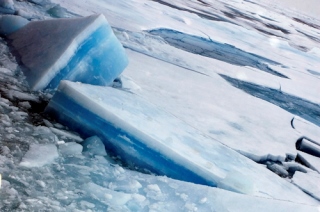Ships trading in the Polar Regions will have to comply with strict safety and environmental provisions specific to the harsh conditions in the Arctic and Antarctic. That's because of the recent adoption of the environmental part of the International Code for ships operating in polar waters (Polar Code) and associated MARPOL amendments to make the Code mandatory by the Marine Environment Protection Committee (MEPC) of the International Maritime Organization (IMO).
MEPC met for its 68th session May 11-15 at IMO headquarters in London.
The Polar Code covers the full range of design, construction, equipment, operational, training, search and rescue and environmental protection matters relevant to ships operating in waters surrounding the two poles.
The newly-adopted environmental provisions cover:
- Prevention of pollution by oil: discharge into the sea of oil or oily mixtures from any ship is prohibited. Oil fuel tanks must be separated from outer shell;
- Prevention of pollution by noxious liquid substances: discharge into the sea of noxious liquid substances, or mixtures containing such substances is prohibited;
- Prevention of pollution by sewage; discharge of sewage is prohibited unless performed in line with MARPOL Annex IV and requirements in the Polar Code; and
- Prevention of pollution by garbage: discharge of garbage is restricted and only permitted in accordance with MARPOL Annex V and requirements in the Polar Code
The adoption of the environmental provisions follows the adoption by the Maritime Safety Committee (MSC) in December 2014 of the safety-related requirements of the Polar Code and related amendments to make it mandatory under the International Convention for the Safety of Life at Sea (SOLAS). The complete Polar Code, encompassing the safety-related and environment-related requirements, is expected to enter into force on Jan. 1, 2017.
The Polar Code will apply to new ships constructed on or after Jan. 1, 2017. Ships constructed before that date will be required to meet the relevant requirements of the Polar Code by the first intermediate or renewal survey, whichever occurs first, after Jan. 1, 2018.




